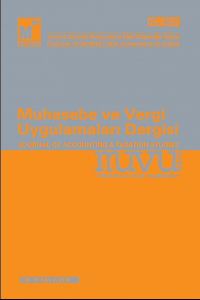Abstract
The aim
of this study is to present the accounting aspect of in meabs of asserting the
methods of payment, to calculate the copyright payments, and to explain the
special accounts of copyright payments and fundamentals of special accounting
records. Copyrights, which are of intellectual properties, hace been classified
in our country in common law as part of "intangible rights". Turkish
Tax Laws also generally use this concept. An enterprise can pay copyrights to
an author in three different ways. These are as follows: copyrights according
to the sales amount, according to the output, and according to lump sum. Different
accounting records are used according to the calculation of the copyrights and
the copyright occurred is recognized as periodic expense or production cost
according to the expenses. While recording copyright expenses as periodic or
production expenses causes a change in periodic income and loss of an
enterprise, the most profitable copyright convention is that made according to the sales amount.
Enterprises can generate incomes by selling the copyrights of a work they
already acquired to another domestic or international company.
Keywords
References
- AKDOĞAN, Nalan ve Orhan Sevilengül (2007), Tekdüzen Muhasebe Sistemi Uygulaması, Gazi Kitabevi, Ankara.
- AYÇİÇEK, Fahri, Ali Haydar Güngörmüş, Bedia Atalay, Ender Boyar, Rabia Kurulu (2013), Dönemsonu Muhasebe İşlemleri, Sürat Üniversite yayınları, İstanbul.BEŞİROĞLU, Akın. ''Fikir Hukuku Dersleri'' İstanbul 2006.
- GÖKGÖZ, Ahmet (2015), Genel Muhasebe, Ekin Kitabevi, Bursa
- Elmacı O, Güngörmüş A.H., Gümüş Yusuf (2002), Maliyet Muhasebesi, Ekspres matbaası, 2002.
- http://www.fikrimulkiyet.com/index.php?option=com_content&task=view&id=21&Itemid=74
- http://www.resmigazete.gov.tr/eskiler/2006/12/20061230-40.pdf
- http://www.telifhaklari.gov.tr
- KİSHALI, Yunus (2016), Tekdüzen Hesap Sistemi ve Çözümlü Muhasebe Problemleri, Beta Basım Yayım, İstanbul.
- ÖZDEMİR, Muharrem ''http://www.alomaliye.com'' , 2002
- ÖZDERYOL, Teknail. ''Fikir ve Sanat Eserleri Kanunu’nda Düzenlenen Suçlar'' İstanbul 2006.
- 193 sayılı Gelir Vergisi Kanunu ''http://mevzuat.basbakanlik.gov.tr
- 213 Sayılı Vergi Usul Kanunu ''http://www.mevzuat.gov.tr/
- 3065 Sayılı Katma Değer Vergisi Kanunu ''http://www.mevzuat.gov.tr/''
- 5520 sayılı Kurumlar Vergisi Kanunu ''http://www.mevzuat.gov.tr/
- 5846 Sayılı Fikir ve Sanat Eserleri kanunu ; ''http://mevzuat.basbakanlik.gov.tr
Abstract
Bu
çalışmanın amacı; yayıncılık sektöründe önemli bir konu olan telif haklarının
muhasebe boyutunun ortaya konularak telif ödeme şekillerinin gösterilmesi,
telif ödemelerinin hesaplanması, telif ödemeleri ile ilgili özellikli
hesapların ve telifle ilgili özellikli muhasebe kayıtlarının yapılış
esaslarının açıklanmasıdır.
Fikri
mülkiyet haklarından olan telif hakları, Ülkemizde önceden beri genel hukuk
içinde “gayri maddi haklar” içinde düşünülmüştür. Türk
Vergi kanunları da genellikle bu kavramı kullanmaktadır.
İşletme
eser sahibine telif hakkını üç farklı yolla ödeyebilir bunlar; satış miktarı
üzerinden telif, üretim miktarı üzerinden telif veya tek seferde ödenen
teliftir. Telifin hesaplanma şekline göre farklı muhasebe kayıtları yapılmakta
ve ortaya çıkan telif giderleri hesaplanma şekline göre dönemsel gider veya
üretim gideri olarak muhasebeleştirilmektedir.
Telif
giderlerinin hesaplanma şekline göre dönemsel veya üretim gideri olarak
kaydedilmesi işletmenin dönem kâr ve zararı üzerinde değişikliğe sebep olurken
işletme için en verimli olan telif anlaşması satış üzerinden yapılan
anlaşmalardır. İşletmeler telif hakkını satın aldıkları bir eseri yurt içinde
veya yurt dışında bir başka firmaya satarak gelir edebilirler.
Keywords
References
- AKDOĞAN, Nalan ve Orhan Sevilengül (2007), Tekdüzen Muhasebe Sistemi Uygulaması, Gazi Kitabevi, Ankara.
- AYÇİÇEK, Fahri, Ali Haydar Güngörmüş, Bedia Atalay, Ender Boyar, Rabia Kurulu (2013), Dönemsonu Muhasebe İşlemleri, Sürat Üniversite yayınları, İstanbul.BEŞİROĞLU, Akın. ''Fikir Hukuku Dersleri'' İstanbul 2006.
- GÖKGÖZ, Ahmet (2015), Genel Muhasebe, Ekin Kitabevi, Bursa
- Elmacı O, Güngörmüş A.H., Gümüş Yusuf (2002), Maliyet Muhasebesi, Ekspres matbaası, 2002.
- http://www.fikrimulkiyet.com/index.php?option=com_content&task=view&id=21&Itemid=74
- http://www.resmigazete.gov.tr/eskiler/2006/12/20061230-40.pdf
- http://www.telifhaklari.gov.tr
- KİSHALI, Yunus (2016), Tekdüzen Hesap Sistemi ve Çözümlü Muhasebe Problemleri, Beta Basım Yayım, İstanbul.
- ÖZDEMİR, Muharrem ''http://www.alomaliye.com'' , 2002
- ÖZDERYOL, Teknail. ''Fikir ve Sanat Eserleri Kanunu’nda Düzenlenen Suçlar'' İstanbul 2006.
- 193 sayılı Gelir Vergisi Kanunu ''http://mevzuat.basbakanlik.gov.tr
- 213 Sayılı Vergi Usul Kanunu ''http://www.mevzuat.gov.tr/
- 3065 Sayılı Katma Değer Vergisi Kanunu ''http://www.mevzuat.gov.tr/''
- 5520 sayılı Kurumlar Vergisi Kanunu ''http://www.mevzuat.gov.tr/
- 5846 Sayılı Fikir ve Sanat Eserleri kanunu ; ''http://mevzuat.basbakanlik.gov.tr
Details
| Primary Language | Turkish |
|---|---|
| Subjects | Business Administration |
| Journal Section | Issue |
| Authors | |
| Publication Date | November 1, 2019 |
| Submission Date | April 15, 2019 |
| Acceptance Date | June 10, 2019 |
| Published in Issue | Year 2019 Volume: 12 Issue: 3 |

This Journal Licensed under a Creative Commons Attribution-NonCommercial 4.0 International License.
This license allows reusers to distribute, remix, adapt, and build upon the material in any medium or format for noncommercial purposes only, and only so long as attribution is given to the creator.


